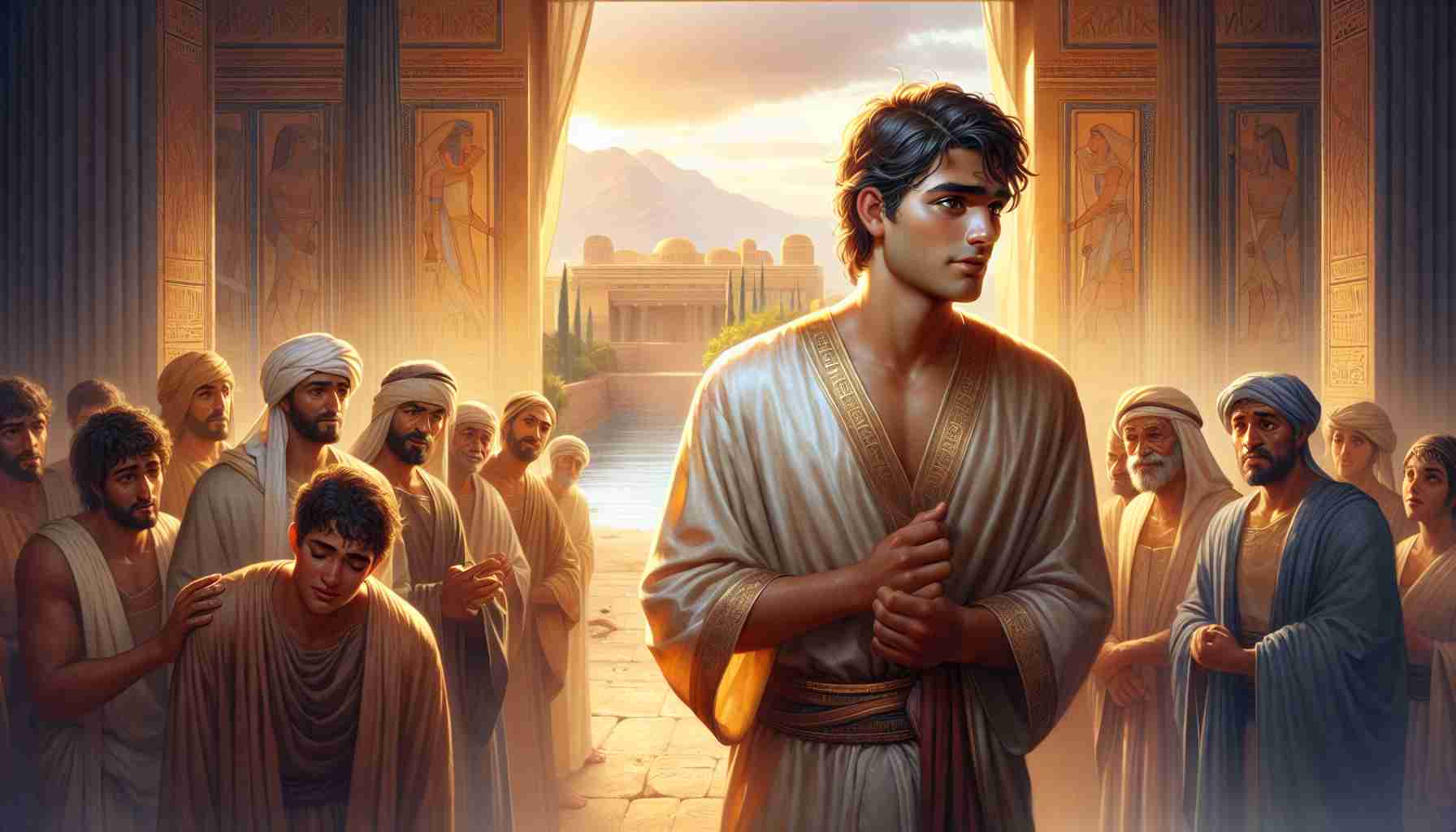

I was only a few steps behind when Joseph’s brothers grabbed him by the arms.
They yanked off the coat—his colorful one, the gift from their father—and threw him into the pit. I remember the sharp sound of his body hitting the bottom. Dust rose. So did silence.
I was the son of a servant, always tagging along behind the older boys. No one noticed me much, and when they did, it wasn’t kindly. But I noticed everything. I saw the hatred in their eyes that day, saw the way jealousy can turn family into enemies. And I heard Joseph cry out—not just in pain, but in disbelief. Like he couldn’t understand why the people who shared his blood had turned on him.
Later, when the traders came—Midianites with camels and coins—the brothers pulled him up and sold him like an old animal. They laughed, jostled each other. Judah hissed, “Let’s see what becomes of his dreams now.”
I couldn’t sleep that night.
Joseph had always talked about his dreams. He dreamed of rising high. Of people bowing down. We all rolled our eyes, but behind his words... he truly believed he was made for something more. Even down in the pit, I think part of him still did.
Years passed like sand slipping through fingers.
None of us thought about Joseph anymore. Not until famine scraped the edges of our land and our stomachs. We journeyed to Egypt like beggars, hoping Pharaoh’s stores would feed us. I walked beside Judah, both of us older, hungrier, quieter than we used to be.
And then—we saw him.
We didn’t know it was Joseph at first. He wore Egyptian robes, spoke their language, and ruled like one of Pharaoh’s own. Powerful. Unreachable.
But I recognized his eyes.
He accused us. Tested us. We didn’t understand. Until everything broke open like a flood.
“I am Joseph,” he said. “The one you sold.”
Silence crashed again, like back in the pit. Some brothers went pale. Others wept. But I stood frozen, watching Joseph—whose dreams had come true after all.
He could have sent us away. He could have punished Judah, who had suggested the sale. But instead, his voice softened.
“Don’t be afraid,” he said. “What you meant for harm, God meant for good. So that many lives would be saved.”
That moment felt like rain after drought. Like breath after choking. Because if Joseph could forgive us—after all we’d done—then maybe God could forgive me, too.
He saved our family that day. Not with weapons, but with mercy.
The miracle wasn’t just that he rose from slavery to power. The miracle was that God never left his side—not in the pit, not in prison, not in Pharaoh’s court.
And somehow, He never left us either.
I still dream sometimes—of brothers laughing again, of full bellies, of a God who makes broken stories whole.
I was only a few steps behind when Joseph’s brothers grabbed him by the arms.
They yanked off the coat—his colorful one, the gift from their father—and threw him into the pit. I remember the sharp sound of his body hitting the bottom. Dust rose. So did silence.
I was the son of a servant, always tagging along behind the older boys. No one noticed me much, and when they did, it wasn’t kindly. But I noticed everything. I saw the hatred in their eyes that day, saw the way jealousy can turn family into enemies. And I heard Joseph cry out—not just in pain, but in disbelief. Like he couldn’t understand why the people who shared his blood had turned on him.
Later, when the traders came—Midianites with camels and coins—the brothers pulled him up and sold him like an old animal. They laughed, jostled each other. Judah hissed, “Let’s see what becomes of his dreams now.”
I couldn’t sleep that night.
Joseph had always talked about his dreams. He dreamed of rising high. Of people bowing down. We all rolled our eyes, but behind his words... he truly believed he was made for something more. Even down in the pit, I think part of him still did.
Years passed like sand slipping through fingers.
None of us thought about Joseph anymore. Not until famine scraped the edges of our land and our stomachs. We journeyed to Egypt like beggars, hoping Pharaoh’s stores would feed us. I walked beside Judah, both of us older, hungrier, quieter than we used to be.
And then—we saw him.
We didn’t know it was Joseph at first. He wore Egyptian robes, spoke their language, and ruled like one of Pharaoh’s own. Powerful. Unreachable.
But I recognized his eyes.
He accused us. Tested us. We didn’t understand. Until everything broke open like a flood.
“I am Joseph,” he said. “The one you sold.”
Silence crashed again, like back in the pit. Some brothers went pale. Others wept. But I stood frozen, watching Joseph—whose dreams had come true after all.
He could have sent us away. He could have punished Judah, who had suggested the sale. But instead, his voice softened.
“Don’t be afraid,” he said. “What you meant for harm, God meant for good. So that many lives would be saved.”
That moment felt like rain after drought. Like breath after choking. Because if Joseph could forgive us—after all we’d done—then maybe God could forgive me, too.
He saved our family that day. Not with weapons, but with mercy.
The miracle wasn’t just that he rose from slavery to power. The miracle was that God never left his side—not in the pit, not in prison, not in Pharaoh’s court.
And somehow, He never left us either.
I still dream sometimes—of brothers laughing again, of full bellies, of a God who makes broken stories whole.